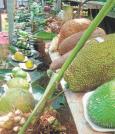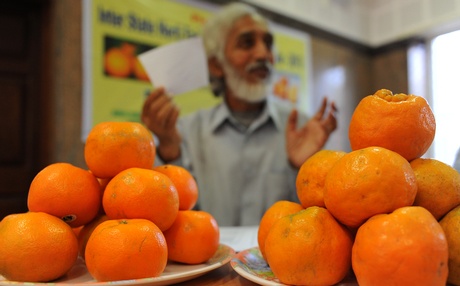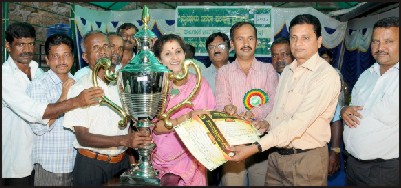Punacha, Bantwal Taluk :
For the 300-odd people who flocked to Mallya Shankarnarayan Bhat’s home in this small village 50 km from Mangalore on Saturday, the visit was worth its while.
 An overwhelming number of them were farmers, and they learnt during the visit things about their vocation they did not even know! They came to know, for instance, that vegetable growing is not seasonal as believed, that veggies can be grown 365 days in a year.
An overwhelming number of them were farmers, and they learnt during the visit things about their vocation they did not even know! They came to know, for instance, that vegetable growing is not seasonal as believed, that veggies can be grown 365 days in a year.
They also learnt that the range of vegetables was wider than generally believed to be. That the range is such that a grower can shift from one vegetable to another in order to avoid loss in times of glut in market, or to beat the pests and diseases. Bhat had organised the get-together to convey to his fellow farmers that vegetable growing was a profitable, round-the-year business, and that it need not be chemical-dependent.
A stunning range of over 200 varieties of vegetables and fruits, with shapes and shades no painter could reproduce, was displayed at Bhat’s house, to impress upon the gathering about the diversity of the greens that are so critical to health. There were a number of members from the gourd family (ridge, bottle, snake, ash, ivy and ‘kaadu peere’- a variety of bitter gourd that is anything but bitter), cowpea, spinach, pumpkin, regular beans, sword beans, bread fruit, passion fruit, jack fruit, star fruit, durian, banana stem, banana shoot, ginger mango, pomelo, elephant yam, ladies finger, gherkins, cucumber, tapioca, wild mosumbi, wild oranges, ‘kanchu huli,’ radish, anjoor, cherry tomatoes, a number of green leafy vegetables.
Some of them are so indigenous that the English names are not available, such as ‘Aane Mungu,’ ‘Maha Phala,’ etc, and many are not even sold in the market any longer. The programme was aptly titled “Varshavidi Tharakaari” (vegetables round the year), was jointly organised by Hopcoms (Dakshina Kannada and Udupi), Horticulture department (DK ZP), Varanasi Jackfruit Growers’ Association (Adyanadka) and Halasu Snehi Koota (Jackfruit Friends’ Forum).
Such was the excitement that the programme generated, that farmers came for as far away as Moodbidri, Madikeri and even Mysore. Many shared their knowledge on growing vegetables round the year, dispelling the widely-held notion that they can’t be grown during monsoon and growing them through organic farming is not profitable.
From door-to-door
Farmer A P Chandrashekar stressed the need to use more and more locally available vegetables like Colocasia (Kesu used in Pathrode), Amaranthus (Harive) and Lancy Crasta. A farmer from Taccode near Moodbidri, explained how he supplies vegetables from door-to-door. C R Shivakumar, a consulting engineer now into farming in Periyapatna, spoke of how he takes vegetables grown in his 18-acre land in Periyapatna to Madikeri every Saturday, but manages to sell it even before he reaches Madikeri!
The programme was inaugurated by cutting a cucumber and plucking ladies finger from a plant. While guests were given a sapling of colocasia, all the visitors were given seeds of a number of vegetables free of cost.
And veggie snacks too!
An added attraction in the day’s programme was the menu for breakfast, lunch and evening tea. Almost everyone was all praise for the host, Mallya Shankarnarayan Bhat. In fact, many had a rare opportunity to taste unique dishes made of unique vegetables.
While Colocasia was served as breakfast with tea/coffee, the lunch had a number of dishes. While the soup was made of ‘Maha Phala’ leaves, the pickle was prepared using ‘Aane Mungu’ and Avil was prepared with bittergourd, cowpea, elephant yam, cucumber, brinjal, ridgegourd. There were three varieties of salads. While the first one was prepared with papaya, pomelo, corn and green gram, the second salad comprised colocasia, ginger and coriander leaves and the third salad had cucumber, banana shoot and ginger. The palav had cowpea, elephant yam, gherkins and beans. The payasam was made of bottle gourd, cucumber and pumpkin and the ‘halva’ had tapioca and cashew nut. The ‘tapioca jamoon’ was a new invention added in the last minute.
For the evening tea, the host served ‘jackfruit bonda’ and fried ‘tapioca podi.’ Not surprisingly, most of the guests ate only vegetables and did not even touch rice!
source: htt://www.deccanherald.com / Sunday Herald / Home> State / by Ronald Anil Fernandes / Sunday, October 07th, 2012



